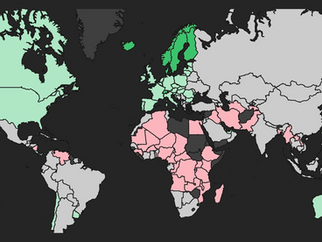top of page

Our Energy and Nature Transition Blogs
Search


The Interview Hour: A Green Finance Leadership Discussion with Peter Fusaro
Our team sat down with Peter Fusaro, founder of the Wall Street Green Summit, to learn about his vision for this year’s summit. Peter is a New York Times bestselling author and global thought leader focused on climate change investment and the Energy Transition since the 1970s. He has been an Advisor to Responsible Alpha since 2022. Our interview covers trends in sustainable finance and looks to the future of financial and market-based climate solutions. Why This Matters
6 days ago


U.S. Electricity Under Pressure: AI Energy Demand
U.S. Data Center Map. Source: Data Center Map . The growing electricity demand fueled by AI and data centers presents significant challenges to the energy landscape. However, U.S. power generation, which has grown only slowly over the past decades, is struggling to keep pace with this surge. This blog also highlights issues related to power generation and the aging U.S. grid, which struggle to keep pace with the need for reliable electricity. Considering these challenges, tec
Feb 12


Investment Strategies for Conservation: One Large Area vs. Many Small Areas
The Single Large or Several Small debates (SLOSS) demonstrate a widely known concept within conservation biology. SLOSS highlights the ongoing argument of the best way to organize protected areas to conserve biodiversity. With the intent to limit species extinction rates, is the course of action establishing a single large and extensive nature reserve or a variety of smaller reserves with equal area? The main principle that supports this debate is the idea of habitat fragmen
Feb 12


Supercritical CO₂ Power: Advances to Commercial Energy
Source: U.S. Department of Energy In December 2025, China commissioned the world’s first commercial supercritical carbon dioxide (sCO₂) power generation unit , known as Super Carbon No.1 , in Liupanshui, Guizhou. Unlike conventional power generation systems that rely on water and steam as the working fluid, sCO₂ power generation uses carbon dioxide in a supercritical state to convert heat into electricity. In practice, this technology is designed to replace traditional steam
Feb 10


Europe’s Regulation, Reforestation, and Restoration
Source: WWF 2024 marked the implementation of EU Nature Restoration Regulation . This policy operates alongside the EU’s Biodiversity Strategy by creating targets dedicated to reversing the ecosystem damage caused by unmitigated economic growth. This strategy stems from the European Green Deal with the goal of slowing the decline of biodiversity by 2030. Why This Matters Restore/Preserve Ecosystem Services: Nature protects and provides for all beings, whether it’s thro
Feb 6


EV and Storage Battery Recycling: Processes, Scale and Profitability
Source: JUICE, Unsplash Battery recycling is increasingly positioned as a critical enabler of energy transition, with implications for critical mineral supply and resource efficiency. As governments and companies pursue pathways toward net positive outcomes by 2050, scaling battery recycling will be essential to reducing reliance on primary extraction and improving the sustainability of battery supply chains. This blog examines battery recycling as an integrated system, cover
Feb 4


Beyond Paris: Europe's +2.4°C Reality and What it Means for Capital Markets
Europe is identified as the fastest-warming continent , and the top 10 countries with the biggest 2023 increases all lie in Europe. The following analysis is based on the UN Food and Agriculture Organization (FAO) dataset, which reports annual land temperature changes compared to the 1951 – 1980 average. Why This Matters Global mean annual temperature change on land reached +1.8°C over 1951 – 1980. Europe saw a mean annual increase of +2.4°C in 2023, and in seven of the past
Feb 3


Skipping Ahead: 1.5°C Arrived a Decade Early
Source: Climate Copernicus EU Over the past 11 years, the Earth has experienced record warm temperatures. Within the past 3 years, the global average temperatures have reached the threshold of 1.5°C. This specific temperature demonstrates the limit created by the Paris Agreement in an attempt to protect the Earth and all its inhabitants from the dangers of global warming. However, Data clearly displays life-altering information about the rapid and aggressive rise in global t
Jan 29


Recycling Critical Minerals: How the EU and U.S. Turn Waste into Supply
Refining concentration by geography and ownership , 2024 (IEA, Global Critical Minerals Report 2025). As clean energy and high-tech industries expand, demand for critical minerals is rising fast, while supply, especially at the refining stage, remains highly concentrated. Because new mining and processing projects are slow and costly to build, both the EU and the U.S. are turning to recycling as a faster way to strengthen supply security. The EU follows a rule-based, target-d
Jan 21


Strategies to Fund Coastal Ecosystems and Wetlands: Follow-up on Dual-Return Research Paper
Following up on our research paper on wetlands finance, we wanted to discuss again wetlands conservation finance this week. Coastal ecosystems and wetlands are one of the most important ecosystems in the world due to the abundance of ecological, economic, and social benefits. Many plants and animals live within coastal wetlands. Wetlands also act as barriers against storms or floods while improving water quality through the filtration of pollutants. These areas are transition
Jan 20


Responsible Alpha's Top 10 in 2025 Forecast Assessment: How Did We Do?
Reflecting upon Responsible Alpha's top January 1, 2025, Responsible Alpha id well. Responsible Alpha’s 2025 Top Ten: 10. ESG In Your Backpack, Ready for Travel: Standardized and Portable ESG Forecast: Demand for standardized and simplified ESG reporting that can be transported across geographies will grow. While ESG is an acronym used for the first time in 2004, many of the underlying ESG metrics are much older . In fact, the metric “reporting the number of members of a bo
Jan 7


Climate Protest at 6K Meters: One Step at a Time to the Summit
As Responsible Alpha celebrates a year of growth delivering key energy and nature transition services for our core set of clients, we want to wish each of you a Happy New Year, and remind you to never give up. To summit a mountain takes one step a time, slowly and patiently. As our mountainer friends like Ossy Freire say it take one step at a time to reach the summit. To our Responsible Alpha friends and colleagues globally, we wish that in 2026 you are able to slowly climb
Jan 2


Responsible Alpha's 2026: Top Ten Trends
Responsible Alpha's 2026: Top Ten Trends are: Energy Transition Keeps Growing Explosive Solar growth in MENA Private Equity Exposed to Catastrophic Climate Hazards European Funds: Balancing Regulation and Competitiveness U.S. Sustainability Funds: Keep Low Profile Batteries are the Lightbulb Large Caps Increase Sustainability Reporting CBAM Launch Climate Adaptation: Now A Strategic Imperative C Suite Renames Sustainability Read the details below: 1. Energy Transition Becom
Jan 1, 2026


Japan’s Green Nuclear Transformation: Transition Bonds Funding Opportunity
Figure 1: Ministry of Economy, Trade, and Industry, 2023 Key Recommendations This paper offers three core implications for investors and financial institutions to consider: Reassessing nuclear exposure as a transition finance opportunity, rather than a blanket ESG exclusion, particularly for long-duration fixed-income portfolios. Prioritizing policy credibility and regulatory stability as core credit factors when pricing Japanese utility bonds, above traditional spread or y
Dec 21, 2025


The Accountability Gap in Global Supply Chains: Why Trade Data Needs Human Rights
Source: Centre for Research on Multinational Corporations “As we reflect on the future of trade, we should always remember its contribution to lifting living standards across the world, and that balanced approaches are needed, in order to mitigate supply chain risks without unduly compromising the benefits that come from global trade for competition, innovation, productivity, efficiency and ultimately growth.“ OECD Secretary-General Mathias Cormann As the business environme
Dec 20, 2025


EU Nature Value at Risk Facing the Banking Sector: Calculating Economic Impacts from Nature Shocks
Source: European Central Bank: Occasional Paper Series No 380, Chart 3 As biodiversity loss and shocks to ecosystems increase due to climate change, there are more impacts than just what meets the eye. Nature Value at Risk (NVaR) evaluates shocks within ecosystem services and how these issues impact production, supply chains, and credit exposure. NVaR dives into endogenous risk and displays the negative impacts of economic activity financed by banks, and how this financing
Dec 19, 2025


LNG Forecasts Decline: Supply Surges, Demand Softens
Global Trade Balance of Liquefied Natural Gas (2023) Global Liquefied Natural Gas (LNG) markets are entering a turning point. The United States and Qatar, are leading a wave of new supply, building faster than demand can adjust. In recent years, LNG demand growth has weakened, particularly in Asia, reducing its role as the marginal buyer and forcing flexible cargoes to be redirected, with Europe acting as a temporary absorber. However, long-term gas demand growth is still exp
Dec 17, 2025


EU Simplifies Sustainability Reporting: What Businesses Need to Know
LSEG Refinitiv Data: Sovereign Sustainability Risk Monitor Responding to industry desires to simplify reporting, the European Financial Reporting Advisory Group (EFRAG) revised the European Sustainability Reporting Standards (ESRS) to reduce sustainability reporting requirements under the EUs Corporate Sustainability Reporting Directive (CRSD). Why This Matters Policy Changes: The simplification of the Double Materiality Assessment (DMA) gives companies' flexibility, resu
Dec 10, 2025


One Manual To Rule Them All: Article 6.2 Clarifies Global Carbon Market
COP30 marked an important step for carbon markets as Singapore, Gold Standard , and Verra launched the Article 6.2 Crediting Protocol , facilitating governments to use voluntary standards for compliance. The concept for the Protocol was first announced by NCCS, Gold Standard, and Verra at COP28 in Dubai in December 2023. At COP29 in Baku in November 2024, initial recommendations were published to outline key concepts and processes. Together, these developments paved the way
Dec 5, 2025


Buzz Kill: Insect Apocaplyse Hurts Global Economy Demonstrating Why We Need Bugs
Insect decline in the Anthropocene: Death by a thousand cuts Source: PNAS Biodiversity collapse means decline insects that pollinate our feed leading to global food supply crises. When people think of species at risk of extinction, insects do not immediately come to mind. Research shows that various types of insects have declined over 70% . From pollinating crops to feeding other animals, our economy needs insects. The goal of this research is to bring attention to the issue
Dec 3, 2025


The Ring of Responsibility: Planetary Boundaries and Global Economics
Source: Doughnut of social and planetary boundaries monitors a world out of balance As the COP30 Conference came to a close on Tuesday, the global community expressed concern over a lack of action on fossil fuel emissions and deforestation. Moving forward, global climate leaders must prioritize a zero fossil fuel emissions plan by 2040 and take action to protect the ecosystems our economies depend upon given that the global economy is surpassing its ecological limits – its pl
Nov 26, 2025


Global Carbon Pricing: Expanding the Road Ahead
The OECD has released its Effective Carbon Rates 2025 report , providing a comprehensive assessment of how carbon is priced across 79 countries through carbon taxes, emissions trading systems, and fuel excise taxes. The report shows that although carbon pricing frameworks are expanding and becoming more complex, less than half of global emissions are exposed to a meaningful price signal, while many sectors continue to be loosely regulated by weak constraints, including free a
Nov 25, 2025


Our Earth’s Tipping Points: A Race Against Time
Our Earth System and Featured Tipping Points, Global Tipping Points Report . Due to Global Warming, the earth is on track to surpass 1.5 °C . This demonstrates both destructive effects on nature systems and devastating impacts on communities around the world. Coral Reefs, The Amazon Rain Forest, and many other natural systems are at extreme risk. This highlights the need for collaboration among experts in nature, finance, and climate change as well as leaders and policymakers
Nov 19, 2025


Capital Costs: New Battleground for Clean Energy
Source: Global Project Finance Spread . Special thanks to Christian Wilson, Gireesh Shrimali, and Ben Caldecott for their paper Financing costs and the competitiveness of renewable power ( https://doi.org/10.1016/j.isci.2025.113777 ) . Capital costs now play a decisive role in determining whether solar and wind can compete with fossil fuels. Rising interest rates have increased borrowing costs for all technologies, but renewables have been hit twice as hard. Lowering the we
Nov 18, 2025
bottom of page

